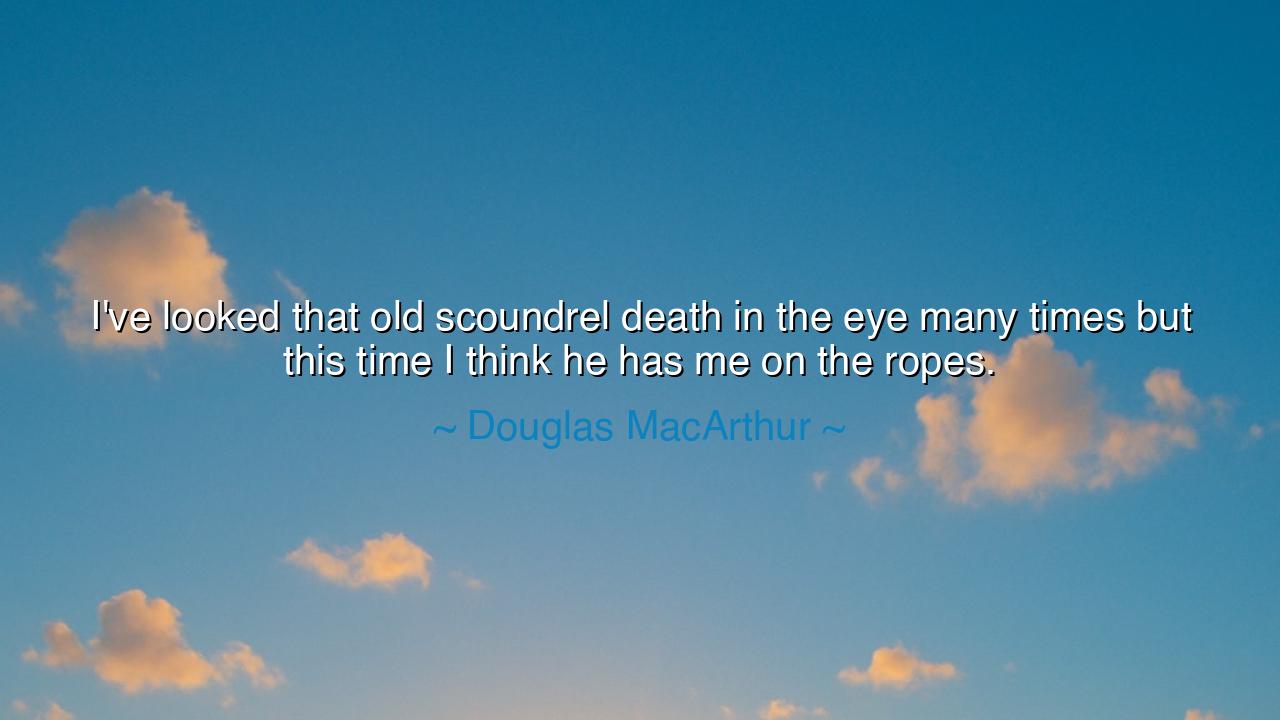
I've looked that old scoundrel death in the eye many times but
I've looked that old scoundrel death in the eye many times but this time I think he has me on the ropes.






When Douglas MacArthur said, “I’ve looked that old scoundrel death in the eye many times but this time I think he has me on the ropes,” he spoke as a warrior at the twilight of his life—a man who had stood before danger countless times and faced it with unflinching resolve. In his words, there is no fear, only the solemn acknowledgment of a long duel finally nearing its end. Death, to him, was not an abstraction nor a terror, but a familiar adversary, an “old scoundrel” he had confronted in battlefields drenched in smoke and blood. The phrase captures both the defiance of the soldier and the humility of the mortal, who, after many victories, senses that his last fight is upon him.
The origin of this quote lies near the end of MacArthur’s extraordinary life, a life steeped in duty and danger. As one of America’s most iconic generals, he commanded men through some of the fiercest conflicts of the twentieth century—from the trenches of World War I to the Pacific campaigns of World War II, and later, the Korean War. Through every storm of fire and fate, he stood as a symbol of discipline, courage, and destiny. Yet even a man of such towering spirit could not command eternity. His words, spoken as illness began to claim him, reveal a rare vulnerability—an acceptance that the final victory belongs not to man but to time. Still, in his tone, there is no surrender of spirit. To call death a “scoundrel” is to rob it of its power, to meet it not as a trembling victim but as an equal, even as it triumphs.
MacArthur’s life was marked by a deep relationship with danger and destiny. He was often accused of arrogance, but beneath that lay a fierce belief in divine purpose—a conviction that some men are called to stand where others fall. In his youth, death met him on the battlefields of France; later, it lurked in the jungles of the Philippines and the volcanic beaches of the Pacific. Each time, he lived, and each time, he grew more certain that he was being preserved for a reason. Thus, when he finally spoke these words, he did so with the wisdom of one who had danced on the edge of mortality too long to fear it. His was the voice of the old warrior, who sees death not as tragedy but as an inevitability that completes the circle of service.
In this way, MacArthur’s quote echoes the wisdom of the ancient heroes. When Achilles knew his fate before the walls of Troy, he did not retreat; he ran toward it, burning with the knowledge that a short life of glory and purpose was better than a long one of mediocrity. Likewise, the Roman general Scipio Africanus, after years of conquest, retired in silence, declaring that the gods who raised him high had done so only to remind him of the dust he would soon return to. MacArthur stood in their lineage—a man who understood that mortality is the final teacher, and that those who have lived with courage can meet death with peace. The words “he has me on the ropes” are not of despair, but of respect for the one adversary that no man can forever withstand.
This quote also reveals the humanity behind the legend. For all his medals, titles, and triumphs, MacArthur was still a man—a son, a husband, a father, and a servant of history. His final reflection is stripped of pride and pretense. He speaks as any mortal might when life’s light begins to dim, yet his phrasing remains unmistakably his: bold, colorful, defiant. To him, death is not a solemn phantom but a brawler, a rival met in the ring. He does not collapse before it; he continues to fight, even as he admits, “he has me on the ropes.” There is, in that admission, both dignity and grace—for true strength lies not in never falling, but in rising, again and again, until the final bell.
MacArthur’s words remind us that the measure of a life is not how long it endures, but how bravely it is lived. To face death without fear is the reward of one who has lived with purpose, who has given his strength and his heart to something greater than himself. Most people spend their lives avoiding the thought of death, shrinking from it as if denial could delay its coming. But the wise, like MacArthur, meet it squarely. They understand that to fear death is to fear life itself. For one cannot truly live if one cannot accept that all things end. The old warrior’s peace comes from knowing he has already given all he could, and that the rest is in the hands of fate.
So, children of courage, take this teaching to heart: do not dread the scoundrel of death, but prepare for him by living nobly. Fill your days with honor, compassion, and resolve, so that when your own time comes, you may stand as MacArthur did—unbowed, unbroken, even as the final battle nears its end. Fear not the closing of the book if every page has been written with purpose. For in the end, it is not the conqueror who defies death, but the one who meets it without regret. And when that old scoundrel comes for you, let him find not a soul in terror, but one still standing, smiling through the final fight, whispering—“I am ready.”






AAdministratorAdministrator
Welcome, honored guests. Please leave a comment, we will respond soon